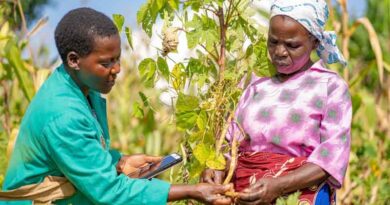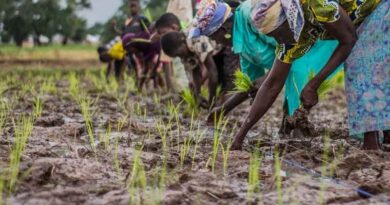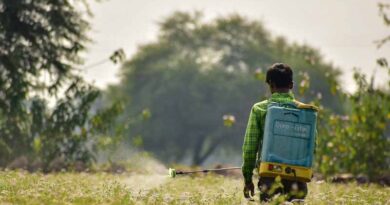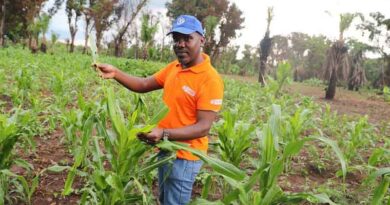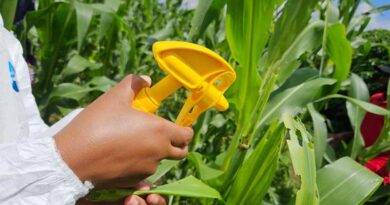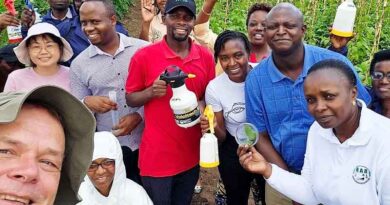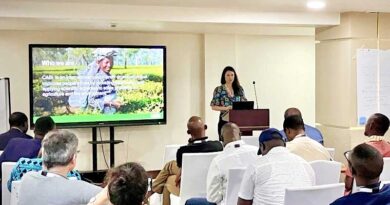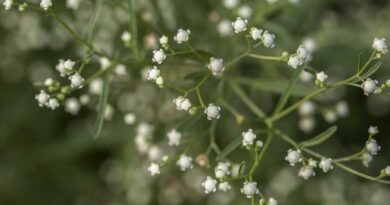How young people are bringing nature-based solutions to farmers
24 July 2023, Africa: Young spray service providers are changing environmental protection and food safety by offering natural alternatives to chemical pesticides. They’re changing farmers’ minds about the types of pest control they use. In this blog, we look at PlantwisePlus training in pesticide application and how the programme supports young people – the future of safer and more environmentally-friendly food production.
Pests and invasive species severely threaten food security in Sub-Saharan Africa, but could young spray service providers be the frontline of action on invasives? In 2021, CABI scientists conducted the first comprehensive study on the economic impact of a range of invasive species on Africa’s agricultural sector. They estimated the cost to be $65.58 billion per year, equivalent to 2.5% of the gross domestic product of all African countries combined.
The pests affect crops essential to farmers’ livelihoods and food security, such as cassava, citrus fruits, tomato, maise and banana. Protecting these crops from pests and diseases is critical. Farmers tend to use pest control products that they know and trust. This includes chemical pesticides that can be toxic or unsafe. They harm not only the environment but also farm labourers and consumer health.
But training young spray service providers in natural, safer bioprotection products is bringing about a change for the better. As the young providers travel from farm to farm, offering their pest control spray services, they bring messages about safer food production and the natural products that are more effective and less harmful.
PlantwisePlus – supporting young spray service providers with training
Last year, PlantwisePlus delivered training to 363 spray service providers in bioprotection products (biopesticides and biocontrol) focusing on food safety and integrated pest management (IPM). This type of training helps to reduce the use of high-risk chemical pesticides. At the same time, it provides farmers with the critically required advisory services for increased quality yields.
These safer alternatives to synthetic pesticides are made from natural substances. They’re better for the environment and consumer health. The PlantwisePlus training can help young people learn new skills, generate a living, and help to protect the environment and food safety. Youth unemployment is high in Kenya. Young people (15 to 34-year-olds) form 35% of Kenya’s population but 67% are unemployed. Pest management training can help give young people income generating opportunities.
The young people trained are seasonal workers. They travel from one farm to another, offering spray services to farmers for a fee. PlantwisePlus sees the training as an opportunity to support young people and work with them to advocate the use of natural, safer pest control products. The young people learn crop bioprotection skills and pass their knowledge to farmers as they move around the region.
How are the spray service providers benefitting from the training?
So far, the programme has trained 130 young men and women under 35 in biopesticides, IPM and natural pest control products. These products are sold through a CABI collaboration with biopesticide producer Koppert. The farmer decides which crops must be sprayed and what products to use. But the spray service providers can offer non-chemical alternatives – products that farmers might not even know exist.
Through the training, PlantwisePlus is changing the range of the products on offer. Young sprayers are becoming advocates of low-risk products. The training also helps the young service providers understand the broader food safety chain and how pesticides are introduced into the chain.
Through PlantwisePlus, the spray service providers are creating business plans. They identify target crops and the products and services they would like to offer. The products the service providers chose to market include a biofertilizer applied mainly during planting, a Phthorimaea absoluta (tomato leafminer, also known as Tuta absoluta) trap and sticky yellow and blue pads. They also offer a false codling moth pheromone trap, which has become one of the most essential products.
Avocado is a lucrative crop in Kenya, and more farmers are growing it. In fact, Kenya is the only African nation in the top 10 producers of avocados with an annual output of over 170,000 tons. But the false codling moth has a devastating effect on avocados, causing much damage. The trainees understand the nature of the problem and recognise the need to introduce a trap to control the pest. The traps are selling well.
Tailoring existing training to help young spray service providers
There are many benefits to biocontrol, and young spray service providers are excited to learn about new products. Like farmers, some didn’t realise that natural pest control products existed. Aware of the benefits of organic produce, the discovery of biocontrol was exciting to them. One explained how the training opened his eyes to what’s possible.
The training uses Plantwise plant doctor materials as a basis. Then tailors them to the young spray service providers’ needs. They are also guided through the CABI BioProtection Portal to look for products they can offer. But this learning experience aims to be much more than just training. It’s about getting the messages of low-risk products out to farmers and boosting young people’s incomes.
By understanding and marketing these natural products, young people have an economic advantage and can grow their businesses. There are outlets in Nairobi that only buy organic produce. As the demand for organic fruits and vegetables increases, the need for biopesticide training will increase. These young people are the forerunners, helping to grow this part of the food value chain. They create a ripple effect, which spreads the word about the benefits of biocontrol.
One spray service provider said, “Through this training, I know there are low-risk products I can access from the agrodealer shops and recommend the same to my farmers.” He explained how the trained service providers could be invited to Kenya’s county government forums, where they meet to discuss agriculture and farming. Here, the providers could market themselves and their businesses.
Looking ahead …
Work still needs to be done in helping to share the messages, but it’s a step in the right direction, addressing several challenges – youth employment, environmental protection, and food safety – with one solution. It is hoped that the service providers become agents of change. After receiving biopesticide training, they’ll recommend new, safer products to farmers. As climate change worsens and pests spread to new regions, young Africans can be part of a movement to change attitudes and practices to crop health.
(For Latest Agriculture News & Updates, follow Krishak Jagat on Google News)



